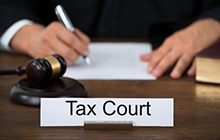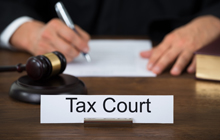FCA overturns Tax Court's decision because the CRA's evidence was about the taxpayer’s spouse

Canadian accountant and tax lawyer David J. Rotfleisch on the Khanna v The Queen decision by the Federal Court of Appeal, which overturned a Tax Court ruling
Introduction
 |
David J Rotfleisch, CPA, JD is the founding tax lawyer of Taxpage.com and Rotfleisch & Samulovitch P.C., a Toronto-based boutique tax law corporate law firm. |
Canada's tax statutes contain various penalties that seek to curb non-compliance. A gross-negligence penalty aims to punish a taxpayer whose conduct "involves a high degree of negligence tantamount to intentional acting, an indifference as to whether the law is complied with or not": Venne v R., 84 DTC 6247. As such, the amount of a gross-negligence penalty can be steep — equalling 50 per cent of any income tax that was underreported as a result of gross negligence and 25 per cent of any GST/HST that was underreported as a result of gross negligence.
Canada's tax legislation demands that the Canada Revenue Agency apply these penalties only in those clear cases warranting their use. Yet in many of the files in which our experienced Canadian tax lawyers have been involved, the CRA's tax auditors have routinely applied gross-negligence penalties without sufficient evidence of gross negligence. We find yet another example of this practice in Khanna v The Queen, 2022 FCA 84.
Gross Negligence Penalties: Subsection 163(2) of Canada's Income Tax Act & Section 285 of Canada's Excise Tax Act
Subsection 163(2) of Canada's Income Tax Act contains the tax-penalty rules relating to gross-negligence penalties. These rules allow the Canada Revenue Agency to levy gross negligence penalties upon any taxpayer "who, knowingly, or under circumstances amounting to gross negligence, has made or has participated in, assented to or acquiesced in the making of, a false statement or omission in [an income-tax] return [that was] filed."
Section 285 of Canada's Excise Tax Act contains analogous tax-penalty rules regarding GST/HST returns, thereby allowing the CRA to impose gross-negligence penalties on a taxpayer who knowingly files incorrect GST/HST returns or who files incorrect GST/HST returns while exhibiting gross negligence.
The amount of the gross negligence penalty
Gross negligence penalties are designed to punish. Hence, if applied, gross negligence penalties can result in an prohibitive tax bill. In the case of incorrect income tax returns, the amount of the gross negligence penalty equals 50 per cent of the tax on the understated income (with a minimum penalty of $100). In the case of incorrect GST/HST returns, the amount of the gross-negligence penalty equals 25% of the understated net tax (with a minimum penalty of $250).
Suppose, for example, that, as a result of gross negligence, you filed an income-tax return that underreported your income, thereby allowing you to evade $500,000 in income tax liability. The resulting gross negligence penalty amounts to $250,000 (i.e., 50% of the $500,000 in tax otherwise payable but for the underreported income).
The Canada Revenue Agency will, of course, assess the tax and interest, too. So, you'll need to pay the $250,000 gross-negligence penalty in addition to both the $500,000 in income tax that you evaded and the interest accruing on top of the $750,000 in tax and gross-negligence penalizes. (And this doesn't even account for any additional exposure to criminal tax liability for tax evasion.)
The burden of proof is on the CRA: reversed onus
Gross-negligence penalties aim to discipline taxpayers who flaunt remarkable disregard for Canada's tax rules. Hence, gross negligence penalty rules demand that the Canada Revenue Agency apply these penalties only in clear cases warranting their use.
To that end, these tax penalty rules put the burden of proof on the Canada Revenue Agency. Although a taxpayer generally bears the initial burden of disproving the CRA's factual assumptions in a tax dispute, this burden is flipped when it comes to gross negligence penalties. Subsection 163(3) of the Income Tax Act and subsection 285.1(16) of the Excise Tax Act each expressly say that the CRA bears the "burden of establishing the facts justifying the assessment of [a gross-negligence penalty]."
In principle, the Canada Revenue Agency must prove its case on a balance of probabilities. Yet the jurisprudence suggests that the CRA must in fact discharge a "heavy" burden to impose a gross-negligence penalty: Corriveau v. R, [1999] 2 CTC 2580. In Findlay v Canada, [2000] 3 CTC 152, for instance, the Federal Court of Appeal not only affirmed that the burden of proof lies with the CRA but also held that the CRA must bear this burden regardless of whether the taxpayer can provide a reasonable explanation for the false statement or omission appearing in the tax return. In other words, even if the taxpayer remains silent, the Canada Revenue Agency still carries the onus of proving that the gross-negligence penalty was warranted.
Moreover, any evidence raising doubt about the taxpayer's culpability militates against applying a gross-negligence penalty. In Fourney v The Queen, 2011 TCC 520, the Tax Court of Canada explained that the benefit of any doubt must go to the taxpayer:
Because [a gross negligence penalty] is penal in nature, it calls for a higher degree of culpability and must be applied only where the evidence clearly justifies so doing. If the evidence creates any doubt that it should be applied in the circumstances of the appeal, then the only fair conclusion is that the taxpayer must receive the benefit of that doubt in those circumstances.
Indeed, in Lust v the Queen, 2009 TCC 577, the Tax Court went so far as to say that the Canada Revenue Agency's onus is in fact "greater than on a balance of probabilities and closer to the criminal onus under the Criminal Code."
The elements of the gross negligence penalty: A false statement or omission made "knowingly or under circumstances amounting to gross negligence"
The previous section explained that the Canada Revenue Agency bears the burden of proving that gross-negligence penalties apply. But what exactly is it that the CRA must prove?
To successfully apply a gross negligence penalty, the CRA must meet two criteria:
The Canada Revenue Agency must show that the taxpayer either made a false statement in a tax return or participated in, assented to, or acquiesced in the making of a false statement in a tax return.
The Canada Revenue Agency must establish that the taxpayer either did so knowingly or did so under circumstances amounting to gross negligence. (The CRA need not prove both knowledge and gross negligence; it only needs to show that the taxpayer displayed one of these two attributes.)
The following sections discuss the false-statement requirement, the knowledge requirement, and the gross-negligence requirement in further detail.
The false statement requirement
To successfully apply a gross negligence penalty, the CRA must first show that the taxpayer made a false statement in a tax return (or that the taxpayer or participated in, assented to, or acquiesced in the making of a false statement in a tax return). Generally, this false-statement requirement is relatively easy for the CRA to satisfy. The Canada Revenue Agency need only show that the tax return misrepresented a fact — that is, by purporting an entitlement to a deduction that was in fact unavailable or by omitted taxable income that should have been reported.
That said, the false statement or omission must appear in a tax return that the taxpayer actually filed. Although failing to file tax returns might constitute tax evasion, it doesn't invoke a gross negligence penalty because the legislation requires that the false statement or omission appear in a filed return (see: Lee v The Queen, 2010 TCC 400; Calandra v The Queen, 2011 TCC 7; Khan v The Queen, 2011 TCC 481). So, gross-negligence penalties don't apply if the taxpayer didn't file a return. Still, in cases where the taxpayer filed a return, the CRA can typically satisfy the false statement requirement by demonstrating that a tax return purported something that was false. And this isn't a very high bar.
The CRA typically faces problems when attempting to prove that the taxpayer met the knowledge standard or the gross-negligence standard. Indeed, most of the jurisprudence concerning gross-negligence penalties centers on whether the taxpayer knew that the tax return contained a false statement or on whether the taxpayer exhibited gross negligence in filing a tax return containing a false statement.
The following two sections discuss the knowledge requirement and the gross-negligence requirement in turn.
The Knowledge Requirement
The CRA can satisfy the knowledge requirement by proving that a taxpayer knowingly filed a tax return that contained a false statement. The knowledge requirement imports a subjective test. That is, the inquiry is not whether the taxpayer ought to have known that a statement was false; it is whether the taxpayer subjectively knew about the false statement in the tax return: Fourney v The Queen, 2011 TCC 520, at paras 71-73, 78.
Wilful blindness entails knowledge. So, the CRA can satisfy the knowledge requirement by showing that the taxpayer wilfully turned a blind eye to false statements or omissions in the tax return. The Federal Court of Appeal has adopted the following definition: A "taxpayer is wilfully blind in circumstances where the taxpayer becomes aware of the need for inquiry but declines to make the inquiry because the taxpayer does not want to know, or studiously avoids, the truth. The concept is one of deliberate ignorance": Wynter v The Queen, 2017 FCA 195. In other words, wilful blindness basically covers situations where a person notices something suspicious-i.e., something begging for further inquiry — yet opts to take the ignorance-is-bliss approach.
To demonstrate a taxpayer's wilful blindness, the CRA must prove the existence of suspicious circumstance indicating a need for the taxpayer to inquire about the tax return's accuracy. In Torres v The Queen, 2013 TCC 380, the Tax Court of Canada listed a number of red flags indicating that a taxpayer had exhibited wilful blindness by ignoring the suspicious behaviour of an accountant or other tax preparer:
- the magnitude of the advantage or omission;
- the blatantness of the false statement and how readily detectable it is;
- the lack of acknowledgment by the tax preparer who prepared the return in the return itself;
- unusual requests made by the tax preparer;
- whether the tax preparer was previously unknown to the taxpayer;
- incomprehensible explanations by the tax preparer; and
- whether others had engaged the tax preparer or had warned against doing so, or whether the taxpayer expressed concern to others about the tax preparer.
- This isn't an exhaustive list, and a court is free to consider other relevant circumstances when determining whether a taxpayer exhibited wilful blindness.
The gross negligence requirement
The gross negligence requirement is distinct from the knowledge requirement. While the legal standards of knowledge and of its sister concept, wilful blindness, both import a subjective test, the gross-negligence standard imports an objective test: "Gross negligence is distinct from wilful blindness. It arises where the taxpayer's conduct is found to fall markedly below what would be expected of a reasonable taxpayer. Simply put, if the wilfully blind taxpayer knew better, the grossly negligent taxpayer ought to have known better. [.] While subjective considerations may play a role in either analysis, gross negligence is determined with reference to an objective test." Wynter v The Queen, 2017 FCA 195.
The CRA need not prove both knowledge and gross negligence; the CRA only needs to show that the taxpayer possessed one of these two attributes. So, even if the Canada Revenue Agency cannot establish that the taxpayer knew about the false statement, the gross-negligence penalty may still apply if the taxpayer exhibited gross negligence when making or acquiescing to the false statement appearing in a tax return. And because gross negligence doesn't require actual knowledge and because it depends on whether a taxpayer ought to have known better, it's easier for the CRA to prove gross negligence than to prove knowledge.
That said, gross negligence isn't merely the failure to act as a reasonable person would. This conduct implies negligence, but not gross negligence. Gross negligence requires far more outrageous behaviour. Carelessness doesn't cut it. Instead, the Canada Revenue Agency "must prove a high degree of negligence, one that is tantamount to intentional acting or an indifference as to whether the law is complied with or not. A taxpayer may avoid these penalty provisions where he or she has relied on the erroneous advice of a tax advisor and has not knowingly failed to report income or a capital gain": Zsoldos v. Canada (Attorney General), 2004 FCA 338, at para 21.
This is why courts have denied the CRA's attempts to apply gross-negligence penalties in the following circumstances:
- the taxpayer sought professional-accounting assistance to complete tax returns: Hine v R, 2012 TCC 295.
- the taxpayer made numerous errors on tax returns, indicating a lack of skill in accounting and tax matters: Fourney v the Queen, 2011 TCC 520.
- the taxpayer disclosed all amounts at issue on his or her tax return: Crown Cork & Seal Canada Inc v The Queen, [1990] 2 CTC 465.
- the taxpayer found it difficult to operate accounting software: Fourney v the Queen, supra.
So, even though gross negligence elicits an objective standard, courts routinely overrule the Canada Revenue Agency when its tax auditors apply gross-negligence penalties in cases involving ordinary negligence because "these penalties are meant to capture serious conduct": Wynter v The Queen, 2017 FCA 195, at para 21 (quoting the Supreme Court of Canada's decision in Guindon v. Canada, 2015 SCC 41, at para 61).
Khanna v The Queen, 2022 FCA 84
In 2008 and 2009, Mrs. Khanna and her husband both worked as mortgage brokers for a corporation that they jointly owned, and they jointly owned 18 rental properties. Mrs. Khanna and her husband each filed Canadian income tax returns reporting their rental income.
Several years later, the Canada Revenue Agency audited Mrs. Khanna's and her husband's 2008 and 2009 income-tax returns. To estimate the Khannas' income, the CRA's income tax auditor decided to use the net-worth method, which is a notoriously imprecise means of determining a taxpayer's income. (For more details about CRA net-worth audits and other indirect-income-verification methods, read our article, Canada Revenue Agency Ramps Up Indirect Income Verification Audits on Small and Medium Businesses - A Canadian Tax Lawyer's Guide.
After completing the tax audit, the CRA reassessed Mrs. Khanna and her husband for over $250,000 in unreported income for the 2008 taxation year. These income-tax reassessments also imposed gross negligence penalties upon Mrs. Khanna and her husband. (The CRA also reassessed Mrs. Khanna's husband for unreported income and gross negligence penalties for the 2009 taxation year. But these issues were ultimately abandoned by the taxpayer, so the appellate court's decision doesn't address them. For that reason, our discussion focuses entirely on Mrs. Khanna's assessment for gross negligence penalties.)
The Khannas appealed the reassessments to the Tax Court of Canada. At the beginning of trial, however, the Khannas conceded to the $250,000 in unreported income that the CRA had assessed for the 2008 tax year. So, the sole issue in Mrs. Khanna's appeal concerned her liability for gross negligence penalties.
The Tax Court of Canada concluded that Mrs. Khanna was indeed liable for gross-negligence penalties. In particular, the court found that the Canada Revenue Agency had established the following facts, which justified Mrs. Khanna's assessment for gross negligence penalties:
- Khanna and her husband "were both uncooperative in providing books and records and when they did they were incomplete."
- Khanna and her husband's "personal expenditures exceeded their family reported income by $67,481 in 2008 and $3,456 in 2009."
- The amount of unreported rental income was important and quite large, and Mrs. Khanna reported less than she should have.
- Khanna and her husband did not report rental income of $166,755 in 2009.
- Khanna and her husband were both knowledgeable and should have known that they had unreported rental income.
- Neither Mrs. Khanna nor her husband acted as a reasonable person would have because they were professional mortgage brokers and as such dealt with legal documents, clients, lawyers, and mortgage companies.
Notably, the Tax Court of Canada made these factual findings without Mrs. Khanna's testimony. Only two individuals testified as witnesses before the Tax Court: the CRA's income-tax auditor and Mrs. Khanna's husband. Mrs. Khanna attended the Tax Court hearing, which means that the Canadian tax-litigation lawyer for CRA could have called her as a witness without notice. But the Crown didn't do so.
The dispute reaches the Federal Court of Appeal
Mrs. Khanna's experienced Canadian tax litigator appealed the Tax Court's decision to Canada's Federal Court of Appeal.
Mrs. Khanna's lawyer argued that the evidence before the Tax Court didn't show that Mrs. Khanna was uncooperative in providing books and records during her income-tax audit. Nor did the evidence show, according to Mrs. Khanna's tax litigator, that Mrs. Khanna had failed to report rental income in 2009. Moreover, even if the evidence sufficed to establish the Tax Court's factual findings about Mrs. Khanna, those facts don't satisfy the legal test for applying gross negligence penalties — that is, they don't show that Mrs. Khanna made the misrepresentation knowingly or in circumstances amounting to gross negligence.
The appellate court agreed.
After reviewing the Tax Court transcripts and the evidence on record, the Federal Court of Appeal found nothing to suggest that Mrs. Khanna had been uncooperative during the tax audit or that she had failed to report rental income in 2009. It appeared that Mrs. Khanna had authorized her husband to represent her during the tax audit. Yet, as the court observed, her husband's behaviour during the tax audit doesn't establish Mrs. Khanna's knowledge or gross negligence at the time that her 2008 return was prepared and filed, which occurred years before the tax audit.
The Federal Court of Appeal also observed that Mrs. Khanna was not called as a witness during the Tax Court hearing. Her husband testified as a witness, and he was asked numerous questions about his own unreported income and about the information that he provided to the family's accountants. He was also asked whether he agreed with the assumptions upon which the Canada Revenue Agency based the gross-negligence penalties against him. But he wasn't asked a single question about the facts and assumptions underlying the gross-negligence penalties against Mrs. Khanna. So, even though Mrs. Khanna agreed to accept her husband's testimony, his testimony had nothing to do with what Mrs. Khanna knew or believed about the preparation or filing of her 2008 income tax return.
Indeed, nothing on record established Mrs. Khanna knew, believed, did, or didn't do in connection with the preparation and filing of her 2008 income tax return. The CRA's penalty recommendation report for Mrs. Khanna largely recited facts about her husband. Mrs. Khanna's 2008 tax return was unsigned, and there was no evidence on whether Mrs. Khanna reviewed the return before it was filed. Mrs. Khanna's 2008 tax return did report some rental income, so even if she reviewed the return before it was filed, she may have believed that it reported the correct amount. And although Mrs. Khanna later conceded to unreported income in the 2008 tax year, there was no evidence establishing whether she knew about this unreported income when her return was filed.
The Federal Court of Appeal therefore overturned the Tax Court's decision, holding that "the Tax Court erred in concluding that [the Canada Revenue Agency] had met the onus under subsection 163(2) to establish [that Mrs. Khanna] was grossly negligent." As a result, the appellate court allowed Mrs. Khanna's appeal and instructed the CRA to delete the gross negligence penalties.
David J Rotfleisch, CPA, JD is the founding tax lawyer of Taxpage.com and Rotfleisch & Samulovitch P.C., a Toronto-based boutique tax law corporate law firm and is a Certified Specialist in Taxation Law who has completed the CICA in-depth tax planning course. He appears regularly in print, radio and TV and blogs extensively.
With over 30 years of experience as both a lawyer and chartered professional accountant, he has helped start-up businesses, cryptocurrency traders, resident and non-resident business owners and corporations with their tax planning, with will and estate planning, voluntary disclosures and tax dispute resolution including tax audit representation and tax litigation. Visit www.Taxpage.com and email David at david@taxpage.com. Read the original article on Mondaq. Photo David Rotfleisch courtesy Rotfleisch & Samulovitch P.C.









(0) Comments